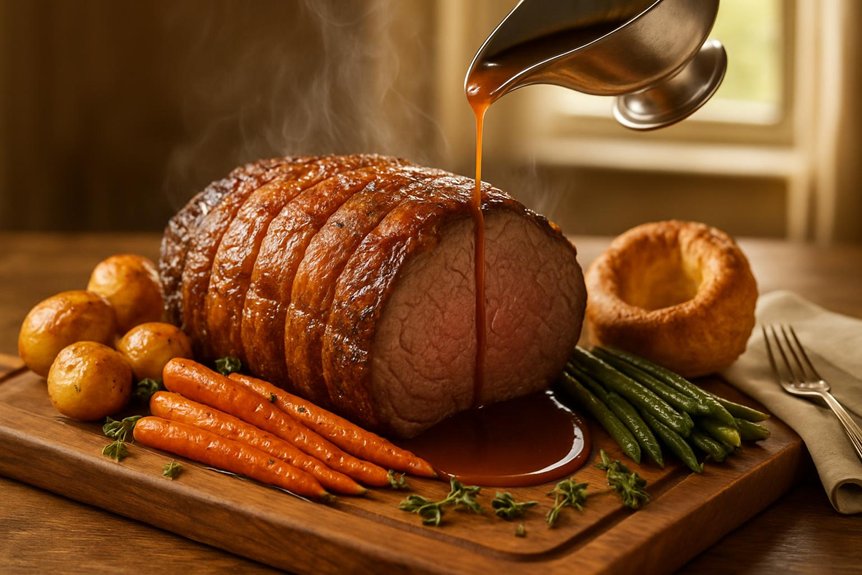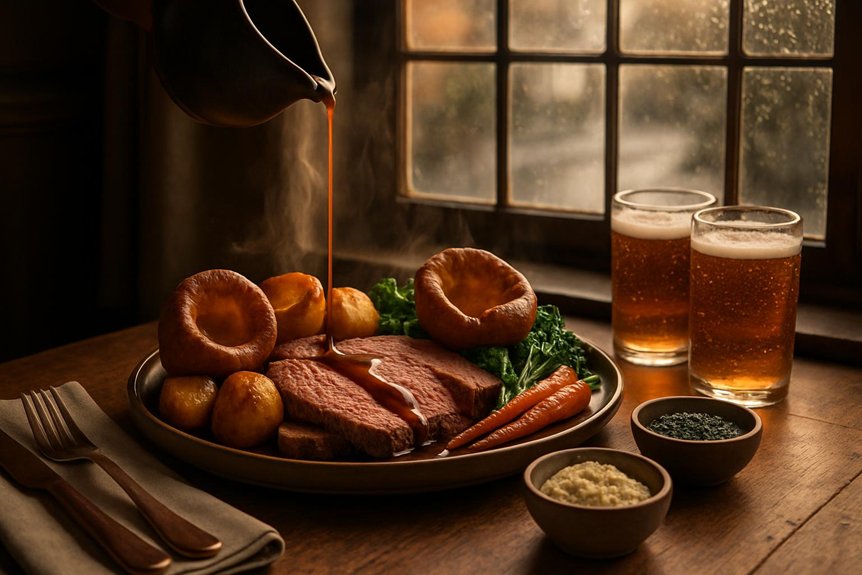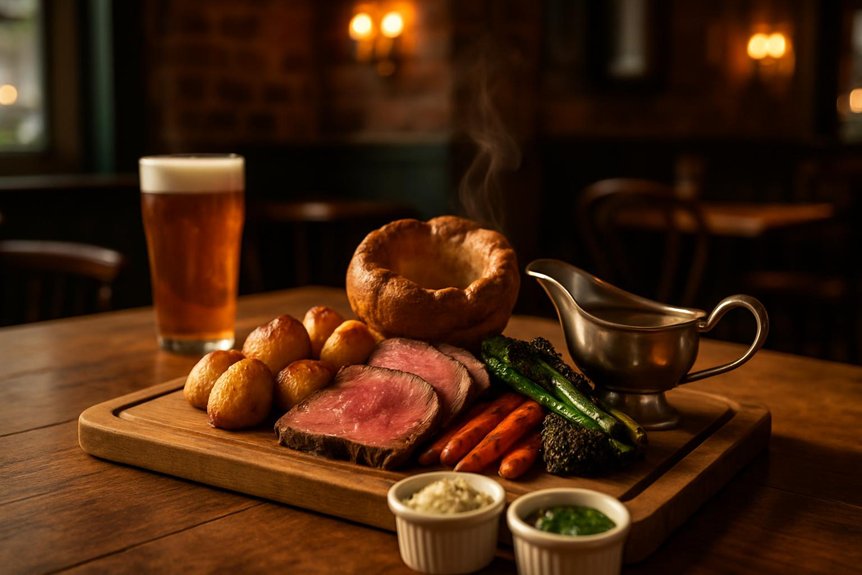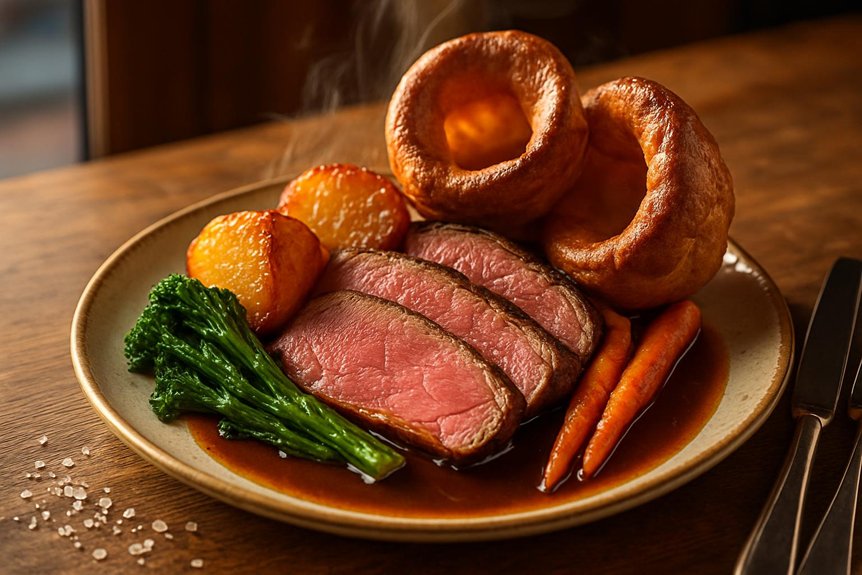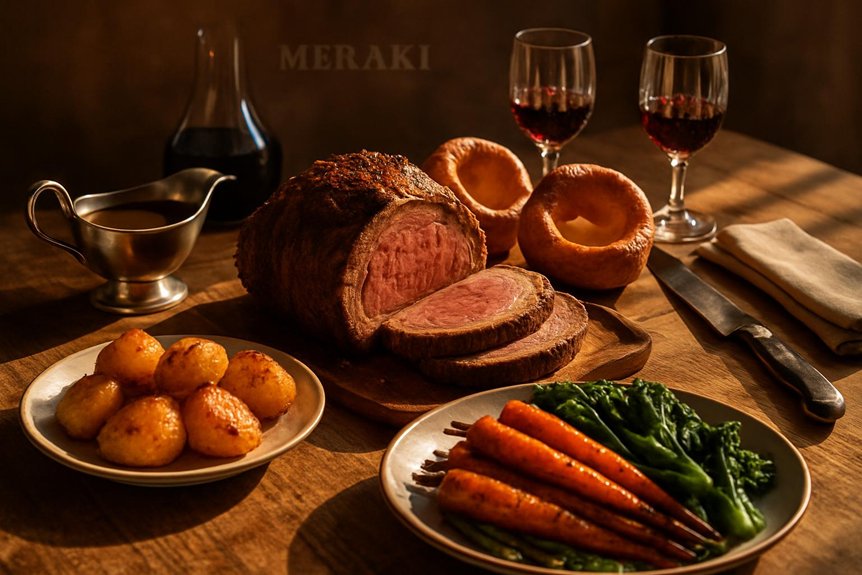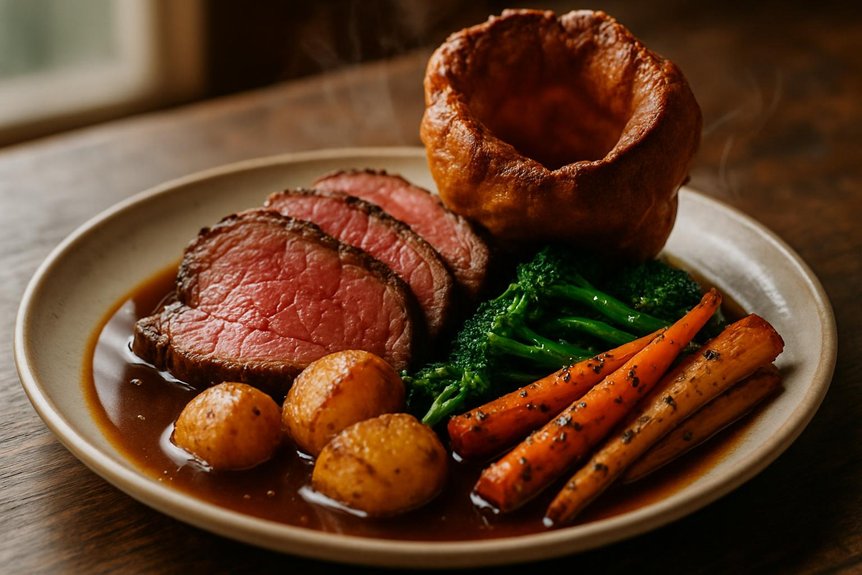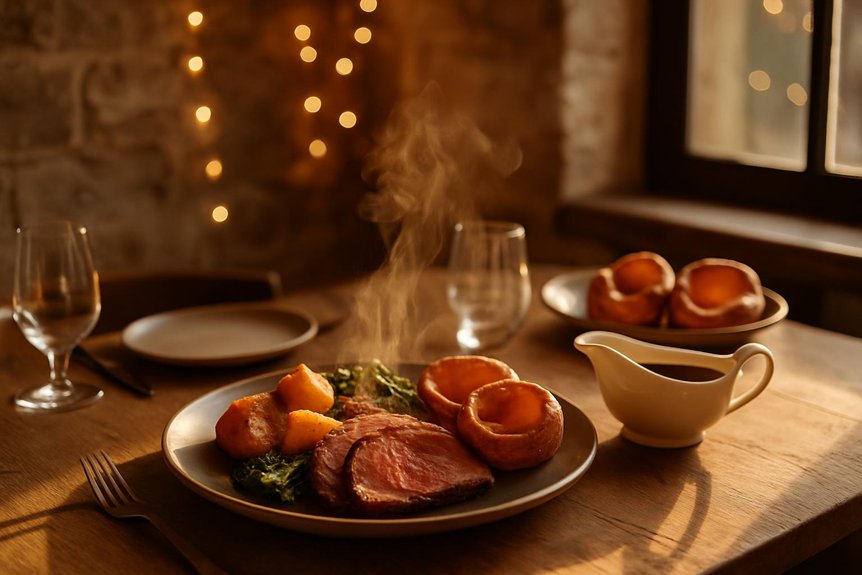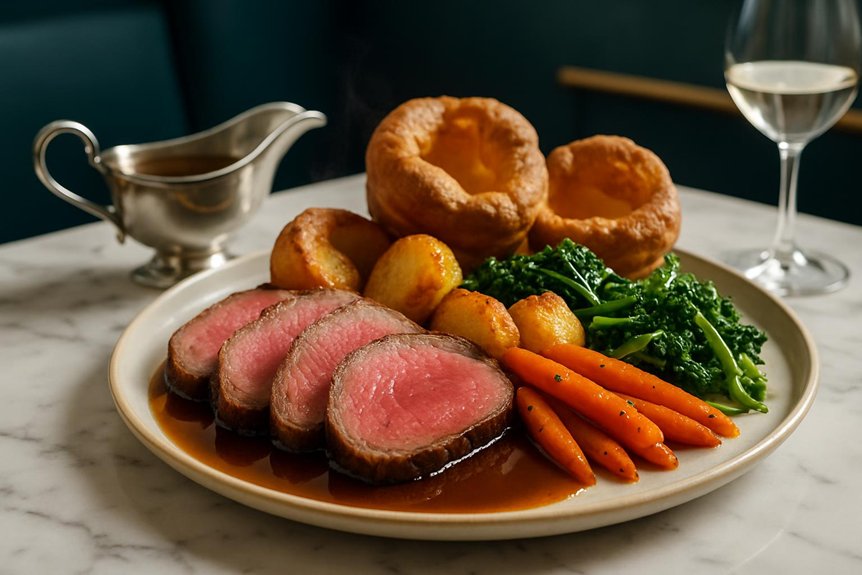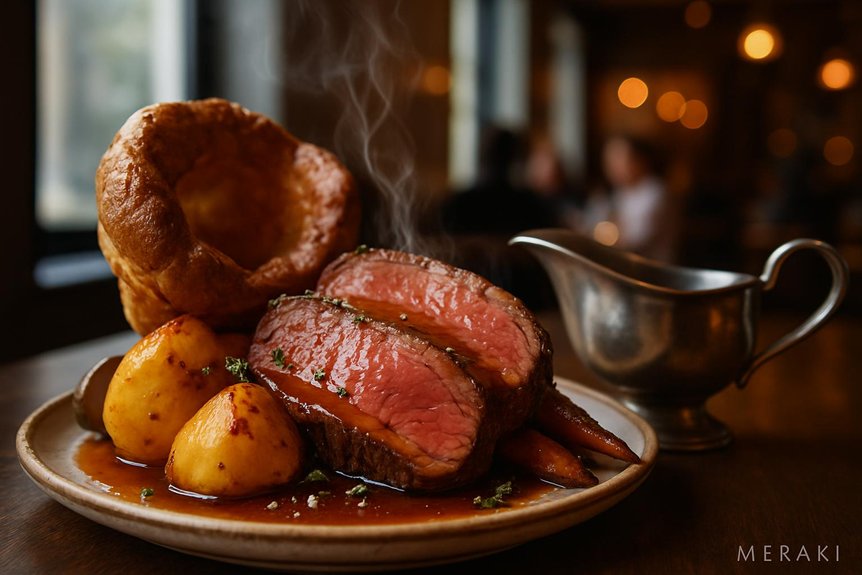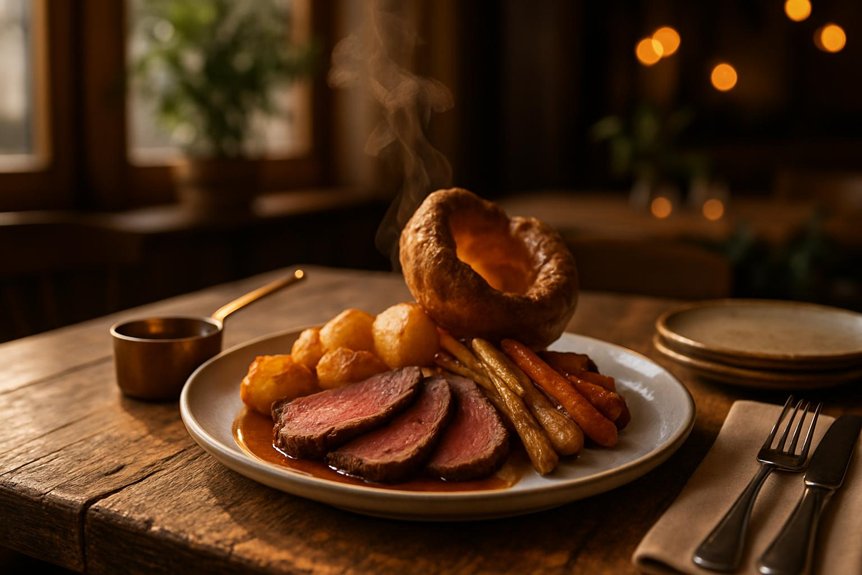Meraki presents a Sunday roast rooted in careful sourcing and practiced technique. Meats are carved from signature cuts, vegetables reflect seasonal suppliers, and sauces are made in-house to complement rather than mask. The atmosphere favors warm materials and attentive service, encouraging a slow, communal meal. For those seeking depth and balance in a classic format, there is more to discover about how each element comes together.
Why Meraki’s Sunday Roast Is a Tradition Worth Keeping
Although the flavors and ritual have evolved, Meraki’s Sunday roast remains a centerpiece of the community: roast meat carved at the table, seasonal vegetables sourced from nearby farms, and gravies and sauces prepared from stock long-simmered to develop depth.
The service honors family traditions and cultivates new ones, creating predictable comfort for regulars and newcomers alike. Staff adhere to consistent pacing and presentation, so courses unfold as part of established Sunday rituals.
Conversation fills the room without overwhelming it; hospitality balances attentiveness with space. Portions are generous yet measured to encourage sharing. Pricing reflects care rather than excess, inviting repeat visits.
Over time, the meal’s rhythm fosters connection, making the roast a durable cultural touchstone within the neighborhood. A visit to Meraki offers a unique nightlife experience with dining, dancing, and great vibes every Thursday, Friday, and Saturday.
Sourcing Local Ingredients for Unmatched Freshness
Meraki sources produce through seasonal farm partnerships that prioritize peak ripeness and ethical practices.
Each ingredient carries a traceable provenance label, allowing staff and guests to verify origin and harvest date.
This transparency reinforces quality and supports the local farming community.
Seasonal Farm Partnerships
A network of nearby family farms supplies the restaurant with the bulk of its seasonal produce, dairy, and heritage meats, ensuring ingredients arrive at peak freshness and traceable provenance. Chefs adjust menus weekly to reflect what those partners harvest so each roast highlights a precise moment in the local growing calendar. The restaurant frames its sourcing as Farm to Table stewardship, prioritizing Sustainable Practices like rotational grazing, organic vegetable beds, and reduced-chemical pest control. Regular visits and shared planning calendars align harvest windows with menu commitments, minimizing waste and maximizing flavor. Cooperative ordering supports small-scale producers financially, while culinary teams convert intimate yields into concentrated, ingredient-forward roasts that celebrate regional soils and seasonal rhythms. At Meraki, extensive wine menu prioritizes Greek wines, further enhancing the dining experience with carefully selected pairings.
Traceable Provenance Labels
Traceable provenance labels link each roast and side to its exact farm, field, and harvest date, giving diners clear, verifiable information about origin and handling. Meraki presents traceable labels on menus and packaging so guests can confirm animal welfare practices, harvest methods, and transporter details. Chefs use the system to plan menus around peak freshness, reducing waste and ensuring consistent flavor. Staff reference provenance data when answering questions, fostering trust and educating patrons about seasonality. The restaurant’s commitment to farm to table sourcing is documented through digital records accessible via QR codes, enabling instant verification and supplier transparency. This rigorous approach reinforces Meraki’s ethical standards while enhancing the dining experience through accountable, locally rooted ingredients. Meraki’s commitment to authenticity is evident not only in its sourcing practices but also in the Mediterranean-inspired menu that prioritizes vibrant flavors and traditional techniques.
Signature Cuts and Expert Roasting Techniques
When selecting signature cuts, the roast master prioritizes muscle structure, intramuscular fat, and thickness to guarantee consistent cooking and ideal flavor development. Cuts are chosen for predictable connective tissue breakdown and flavor concentration, then trimmed and rested to conserve juices.
Searing techniques create Maillard crusts before oven roasting at calibrated temperatures; timing is monitored with probe thermometers to reach target doneness without overcooking. Reverse-sear methods and controlled carryover heat provide even interiors.
Attention to seasoning balance enhances natural meat profiles rather than masking them. Grill mastery complements roasting for smoky accents on select portions, while slicing protocol and plating artistry ensure each portion presents consistent texture and appearance. Service timing aligns to retain temperature and succulence.
Housemade Gravies, Sauces, and Seasonal Sides
How does each sauce elevate the roast without overpowering it? The kitchen at Meraki crafts housemade gravies and sauces restrained in richness and tuned to the meat’s character.
Classic beef jus is reduced gently to concentrate savory notes; herb-infused pan sauces add brightness; a mild mustard cream offers tang without masking texture. Components are balanced so the roast remains central while sauces accentuate umami, acidity, or fat.
Seasonal sides rotate to complement these choices: roasted root vegetables in autumn, charred greens in spring, and buttered new potatoes in summer, each prepared simply to showcase freshness.
Portioning and plating ensure flavors mingle without crowding, producing a cohesive plate where sauces and seasonal sides support, not compete with, the main roast.
Vegetarian and Plant-Based Roast Options
Although rooted in the same Sunday-roast tradition, Meraki’s vegetarian and plant-based roasts are conceived to foreground texture and layered seasoning rather than mimic meat. Chefs design compositions built on roasted root vegetables, nut-and-grain loaves, and whole-cauliflower crowns glazed with herb-forward reductions, highlighting contrast between crisp exteriors and tender interiors.
Plant based innovations appear in inventive binders, fermented condiments, and umami-rich mushroom blends that deepen savory profiles. Seasonal vegetables and charred brassicas provide both substance and visual impact.
For guests seeking Vegan alternatives, attention to dairy-free creams, yeast-based gravies, and nut milks guarantees richness without compromise. Presentations emphasize balance—starches, bright acids, and aromatic herbs—to satisfy traditional expectations within a thoughtful, modern vegetarian framework.
Pairing Your Roast With Perfect Wines and Beverages
A well-chosen drink elevates Meraki’s Sunday roast by balancing richness, cutting through fat, and echoing aromatic notes on the plate. The restaurant’s sommelier recommends Vintage wines for ageable roasts, selecting bottles with structured tannins to lift savory sauces.
For lighter or herb-accented roasts, crisp whites or rosés provide brightness without overpowering.
Craft beers appear alongside heartier cuts; malty ambers and saisons complement caramelized vegetables and roasted root sweetness.
Nonalcoholic options such as spiced teas and artisanal sodas are offered to refresh the palate.
Suggested pairings include:
- A mature Bordeaux-style Vintage wines with beef and rich jus.
- Saison or amber craft beers with pork and fennel.
- Dry rosé or unoaked white for chicken and herb-forward dishes.
How Meraki Creates a Warm, Welcoming Dining Experience
Meraki cultivates a cozy, inviting ambience through warm lighting and comfortable seating that encourages lingering over a Sunday roast.
Attentive, friendly staff anticipate needs without intruding, ensuring service feels effortless.
Thoughtful personal touches — from handwritten menu notes to tailored dish recommendations — make each visit feel considered and welcoming.
Cozy, Inviting Ambience
When stepping through the door, guests are immediately wrapped in soft lighting, warm wood tones, and the quiet murmur of contented conversation, a combination that makes the dining room feel intimate without being cramped. The space cultivates a cozy ambiance and an inviting atmosphere through deliberate design choices that prioritize comfort and understated elegance.
Table arrangements balance privacy and sociability, while curated music complements rather than competes with conversation. Small details reinforce warmth: handcrafted ceramics, linen napkins, and seasonal centerpieces.
Lighting shifts subtly between day and evening service to maintain a relaxed mood. Visual cues and tactile elements work together to soothe, encouraging leisurely meals and meaningful connection without overstated theatrics.
- Low, layered lighting
- Natural materials and textures
- Thoughtful table spacing
Attentive, Friendly Staff
Though largely unobtrusive, the staff at Meraki read the dining room with practiced attentiveness, anticipating needs before guests must ask. Servers move with quiet efficiency, offering guidance on menu choices and timing courses so conversation flows uninterrupted.
Interactions are warm without being intrusive, embodying friendly service that puts patrons at ease from arrival to departure. Attention to detail shows in prompt refills, clear explanations of specials, and swift resolution of any issue, reflecting genuine attentive care.
The team’s professionalism balances accessibility and discretion, creating a calm, confident atmosphere. Regular turnover is handled smoothly, and seating adjustments occur with minimal disruption.
Thoughtful, Personal Touches
A few small gestures — a handwritten note on a birthday table, a server who remembers a guest’s tea preference, a plate adjusted for a mobility aid — quietly shape the room’s welcoming tone.
Meraki layers intentional details into the dining atmosphere to make each visit feel curated rather than canned. Staff log subtle preferences and review guest feedback to refine timing, seating, and menu suggestions.
The result is a cozy, efficient service rhythm that anticipates needs without intruding. Examples include:
- A reserved corner with adjustable lighting for quiet conversations.
- Personalized menu marks indicating past favorites and allergies.
- A follow-up note thanking guests and inviting constructive guest feedback.
These touches create a consistent, warm impression that builds loyalty and calm.
Conclusion
As twilight settles, the roast at Meraki becomes a lantern—its golden crust a beacon of shared ritual, its steam the map guiding diners to comfort. Local roots, expert hands and housemade sauces weave like braided ropes, binding table to town. Vegetarian plates stand as flourishing gardens beside the hearth. Glasses clink like small bells, marking communion. In this warm glow, tradition is both served and renewed, a slow, savored promise on every plate.
